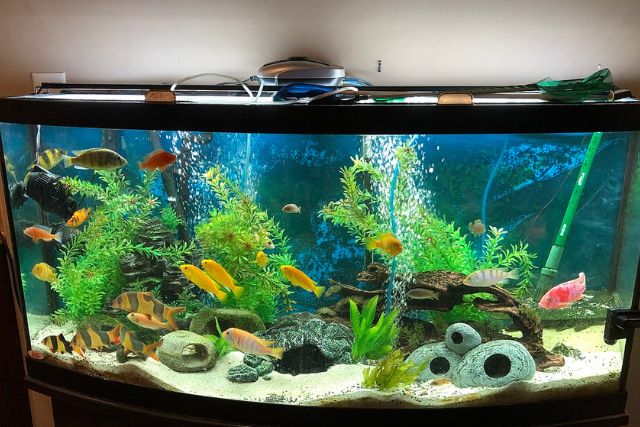Table of Contents
Have you ever wondered whether you should turn off your fish tank light at night? The answer is yes, and there are several reasons why. In this article, we will explore the importance of turning off your fish tank light at night, including the effects on your fish’s health and behavior.
We’ll also discuss the best times to turn off your fish tank light and how to create a natural day-night cycle for your aquatic pets.
Whether you’re a seasoned aquarist or a beginner, read on to discover how turning off your fish tank light at night can benefit your fish and ensure their overall well-being.
Why Turning Off Your Fish Tank Light at Night is Important
If you’re wondering whether you should turn off your fish tank light at night, the answer is yes. Turning off your fish tank light at night is important for several reasons.
Firstly, fish need darkness to rest and regulate their biological and physiological functions. Just like humans, fish need to sleep and turning off the light at night helps them to do so. Constant exposure to light can lead to stress, sleep deprivation, and even illness in fish.
Secondly, leaving your fish tank light on at night can disrupt the natural day and night cycle of your fish. Fish have evolved to live in a cycle of light and dark, and disrupting this cycle can lead to behavioral and health problems.
For example, if your fish are nocturnal, they may become stressed and disoriented if you leave the light on at night.
Thirdly, leaving your fish tank light on at night can lead to an increase in algae growth. Algae thrive in the presence of light and can quickly take over your tank if left unchecked. This can lead to poor water quality and health problems for your fish.
In summary, turning off your fish tank light at night is important for the health and well-being of your fish. It allows them to rest and regulate their biological functions, maintains their natural day and night cycle, and helps to prevent algae growth in your tank.
Factors to Consider Before Deciding to Turn Off Your Fish Tank Light at Night
When it comes to deciding whether to turn off your fish tank light at night, there are several factors to consider. Here are some of the most important ones:
1. The Type of Fish You Have
Different types of fish have different lighting requirements. Some fish, such as bettas, need a lot of light to thrive, while others, such as nocturnal catfish, prefer darkness. Research the lighting needs of your specific fish species before making a decision.
2. The Age of Your Fish
Young fish may need more light than older fish to grow and develop properly. If you have young fish in your tank, you may need to keep the light on for longer periods of time. Conversely, older fish may need less light.
3. The Presence of Live Plants
If you have live plants in your tank, they will need a certain amount of light to photosynthesize and grow. However, too much light can cause algae to grow, which can be harmful to your fish. Consider using a timer to regulate the amount of light your plants receive.
4. Your Schedule
If you’re not home during the day, you may want to keep the light on longer at night to make up for the lack of natural sunlight.
However, if you’re home during the day, you may want to turn the light off at night to mimic the natural day-night cycle.
5. Your Personal Preference
Ultimately, the decision to turn off your fish tank light at night is up to you. Consider your own personal preferences and the needs of your fish and plants before making a decision.
If you’re unsure, consult with a knowledgeable aquarium expert or do further research to make an informed decision.
In summary, there are several factors to consider before deciding to turn off your fish tank light at night. The type of fish you have, the age of your fish, the presence of live plants, your schedule, and your personal preference are all important factors to take into account. Make sure to do your research and consult with an expert if you’re unsure.
How to Turn Off Your Fish Tank Light at Night
Turning off your fish tank light at night is a simple process that can help keep your fish healthy and happy. Here are some steps to follow:
- Determine the best time to turn off your fish tank light. Many fish need a period of darkness to rest and recharge, so it’s a good idea to turn off the light at night. You can use a timer to ensure that the light turns off at the same time every night.
- Turn off the light switch or unplug the light. If your fish tank light has a switch, simply flip it to the off position. If your light is plugged into an outlet, unplug it from the wall.
- Cover the tank with a towel or blanket. This will help block out any ambient light in the room and create a dark environment for your fish. Make sure the cover is secure and won’t fall into the tank.
- Use a moonlight or nightlight. If you want to provide some light for your fish at night, consider using a moonlight or nightlight. These lights are designed to provide a low level of light that won’t disturb your fish’s sleep.
- Monitor your fish. After you turn off the light, keep an eye on your fish to make sure they are adjusting well to the new routine. If you notice any changes in their behavior or health, consult with a veterinarian or fish expert.
By following these steps, you can help ensure that your fish get the rest they need to stay healthy and happy.
Tips for Maintaining a Healthy Fish Tank Environment
Maintaining a healthy fish tank environment is crucial for the well-being of your fish. Here are some tips to help you keep your fish tank environment healthy:
- Turn off the lights at night: Turning off the lights at night can help to simulate the natural day and night cycle of your fish. Fish need a period of darkness to rest and recharge, just like humans do. Leaving the lights on all the time can cause stress and disrupt their sleep cycle. So, it’s recommended that you turn off the lights at night to give your fish a break.
- Keep the water clean: Clean water is essential for the health of your fish. Make sure to change the water regularly and keep the filter clean. A good filtration system will help to remove waste and debris from the water, keeping it clean and healthy for your fish.
- Maintain the right temperature: Different species of fish have different temperature requirements. Make sure to research the ideal temperature range for your fish and adjust the temperature accordingly. A stable temperature is crucial for the health of your fish.
- Provide adequate oxygen: Fish need oxygen to survive. Make sure to provide adequate oxygen by using an air pump or other oxygenation device. A lack of oxygen can cause stress and health problems for your fish.
- Avoid overfeeding: Overfeeding can cause health problems for your fish and lead to poor water quality. Make sure to feed your fish the right amount of food and avoid overfeeding. A good rule of thumb is to feed your fish only what they can eat in a few minutes.
By following these tips, you can maintain a healthy fish tank environment for your fish. Remember to always research the specific needs of your fish and adjust your care accordingly.
Conclusion
In conclusion, whether you should turn off your fish tank light at night depends on various factors such as the type of fish you have, the size of your tank, and the lighting requirements of your plants.
If you have nocturnal fish, it is best to turn off the lights at night so that they can rest and maintain their natural sleep cycle. However, if you have diurnal fish, leaving the lights on during the day and turning them off at night may help them maintain their natural circadian rhythm.
It is also important to consider the size of your tank. If you have a small tank, leaving the lights on for too long can cause an increase in temperature, which can be harmful to your fish. On the other hand, if you have a large tank, leaving the lights on for too long can cause algae growth, which can be harmful to your fish.
Finally, if you have live plants in your tank, they require a certain amount of light to thrive. You may need to adjust your lighting schedule to ensure that your plants get enough light during the day and have a period of darkness at night.
Overall, it is important to find a balance between providing enough light for your fish and plants while also allowing them to rest and maintain their natural sleep cycle.
By considering the factors mentioned above and adjusting your lighting schedule accordingly, you can create a healthy and thriving environment for your aquatic pets.







